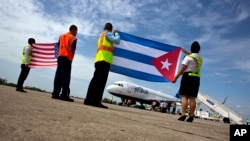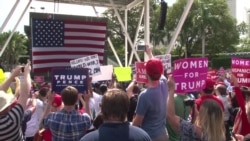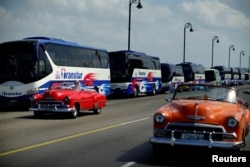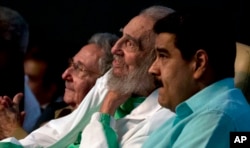President Donald Trump on Friday will begin rolling back some of his predecessor's actions that were meant to engage Cuba after more than a half-century of isolation by the United States.
“The policy goes into effect tomorrow, but the policy directs the creation of new regulations so the actual impact occurs when those regulations go into effect,” a senior White House official told reporters on Thursday evening.
Watch: Trump Expected to Tighten US Cuba Policy
The actions, to be unveiled by the president in Miami's Little Havana district on Friday, will tighten travel restrictions for Americans and ban doing business with the island nation's military conglomerate, GAESA, which is estimated to control more than half of the Cuban economy.
“The driver of Trump's policy is that the actions taken by the previous administration of Barack Obama were enriching the Cuban military and intelligence services,” said the senior official at the White House.
’Opportunity to change'
Washington hopes the “Cuban regime will see this as an opportunity to change reforms that they paid lip service to a couple of years ago, but has not been implemented to the benefit of the Cuban people,” said the official.
Measures will be enacted to restrict the flow of money from the United States to Cuba and the existing statutory ban on tourism will be strictly enforced, effectively “ending individual people-to-people travel,” meaning that any American going to the island will have to be part of a group, a U.S. official explained.
Supporters of President Obama's opening to Cuba say reinstating tougher travel and business restrictions will have the opposite of their intended effect.
Brett Bruen, who as director of global engagement in the Obama administration played a role in loosening the policy of isolating Cuba, said Trump's policy will not only set back relations with Cuba, but with much of Latin America.
“For decades our policy was a hindrance to efforts to forge closer ties with countries across the hemisphere, and under President Obama's leadership, we were able to take that obstacle off the table and to engage more effectively in countries like Brazil, Nicaragua Honduras,” Bruen said. “Returning to the days of barriers and blockades will hurt American foreign policy, it will hurt American companies, and ultimately we will bear the brunt of the consequences.”
Trump administration officials briefing reporters Thursday said some things will not change.
Some things remain
There will be no intention in new regulations to be drafted “to disrupt the existing business that has occurred” intended to give relief to Americans who have made significant recent investments in Cuba and “there aren't any changes on regulations for Americans to legally bring back such popular items as rum and cigars,” according to a White House official.
U.S. officials say the president is keeping a campaign promise to crack down on Cuba due to increased human rights abuses.
The Trump administration has been criticized for not taking a consistent approach on human rights globally.
A senior administration official Thursday rejected that charge, saying Cuba is being singled out because it's “a repressive regime in this hemisphere.”
But Marguerite Jimenez, senior associate for Cuba at the Washington Office on Latin America, called the policy reversal “fundamentally misguided.”
“There is no question that Cuba ought to do more to permit its citizens full freedom of expression and association,” Jimenez said. “However, a return to failed policies of the past will inevitably halt progress and only make life more difficult for Cubans on the island.”
The United States imposed an embargo on Cuba, a former Spanish colony in the Caribbean, in 1960, two years after communist revolutionary Fidel Castro ousted dictator Fulgencio Batista.
Failed sanctions
Subsequent decades of sanctions failed to remove Castro and his brother, Raul, from power.
Obama re-established diplomatic relations, a move that will not be affected by Trump's measures.
There will also be no return to the so-called “wet-foot, dry-foot” policy, which Obama ended after 20 years shortly before he left office in January.
Its end meant that Cuban nationals who were able to touch American soil could stay and become permanent residents after one year while those caught at sea were returned to the island nation.










